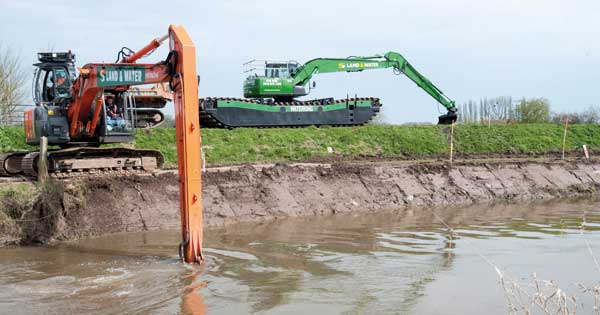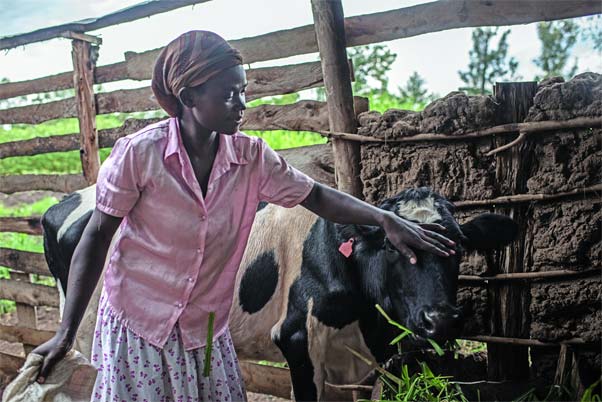Furthering goal 5, this report examines the aggregate results of companies using the Women's Empowerment Principles Gender Gap Analysis Tool (WEPs Tool) with the aim of providing insight into global corporate performance on gender equality and women's empowerment aligned with the WEPs. The study also demonstrates the value of using the WEPs Tool and showcases the efforts of partners and other stakeholders to drive gender equality around the world.
Farmers Weekly,
24 November 2017
Water management - and ensuring an adequate supply for everyone - is one of the biggest challenges being faced by the UK. In a move by the Environment Agency, internal drainage boards could be given a bigger role in making that happen, helping to reducing flood risks to farmland and local villages in the process. This helps meet SDG 6, Clean Water and Sanitation.
Farmers Weekly, 13 October 2017
Nearly 30 years on from its launch by a group of UK West Country dairy farmers, the charity Send a Cow is making a big difference to people’s lives in seven countries in Africa. With its new campaign under way, Farmers Weekly finds out what the charity hopes to achieve and how farmers abroad are benefiting with the help of their UK counterparts. Endeavours such as this support SDG 1 No Poverty, and SDG 2 Zero Hunger and are a great example of SDG 17 Partnerships for the goals in action.
LexisNexis Legal & Professional,
LexisNexis Business Insight Solutions, 12 October 2017
The global electronics industry is one of the largest industrial sectors in the global economy, generating more revenue than any other goods-producing sector. This report examines the supply chain risks of forced labour across the industry, and manufacturing and mining in two key countries: Malaysia and the Democratic Republic of the Congo. It includes an analysis of top electronics brands. This report highlights the challenges in advancing target SDG 8.7 to take immediate and effective measures to eradicate forced labour, end modern slavery and human trafficking.
Children and Extreme Violence, United Nations University, New York, October 2017.
Contributing to SDGs 17 (Partnerships for the Goals) and 16 (Peace, Justice and Strong Institutions), the UN collaborated with academics in communications and psychology; practitioners in brand creation, marketing, and cause campaigns; social media experts and practitioners and entertainment content creators to gain a deeper understanding of recruitment typologies, messaging and intergroup competition involving children in the Islamic State.
United Nations University, October 2017.
Directly relating to SDG 16 (Peace, Justice and Strong Institutions), this policy brief looks at how the changing nature of organized crime and corruption may impact state fragility, inequality and conflict in the coming decades.
Children and Extreme Violence, United Nations University, October 2017.
Contributing to SDGs 17 (Partnerships for the Goals) and 16 (Peace, Justice and Strong Institutions), the UN collaborated with scholars and practitioners from a range of fields to explore opportunities to prevent children entering violent non-state armed groups.
United Nations University, New York, October 2017.
Focussing on SDGs 16 (Peace, Justice and Strong Institutions) and 17 (Partnerships for the Goals), this research report explores how organized crime and corruption will impact governance in 2050 and what states can – and should – do about it now.
RELX,
21 September 2017
RELX Group has published a new analysis, conducted by Elsevier, on SDG4: Quality education. This new graphic builds on Elsevier’s 2015 Sustainability Science in a Global Landscape Report, and its 2017 update Sustainability Science in graphic form. Looking specifically at SDG 4, this graphic provides insight into peer-reviewed research on education as related to the themes of the goal.
Accuity,
September 2017
Correspondent banking is the cornerstone of the global payment system, designed to serve the settlement of financial transactions across country borders. It allows companies and individuals to safely move money around the world and supports and encourages global trade. Since the financial crisis, tighter regulations - and in particular the regulatory penalties imposed for violations of anti-money laundering (AML) – have caused western banks to rethink their global strategy. The risks of doing business in many developing nations are beginning to be seen as outweighing the financial benefits brought by correspondent banking activity. As a result, US and European banks have reduced their correspondent banking activity in the riskiest regions.



